Why getting burgled in the digital age isn’t so bad

Oskar Handmark
Founder & Venture lead
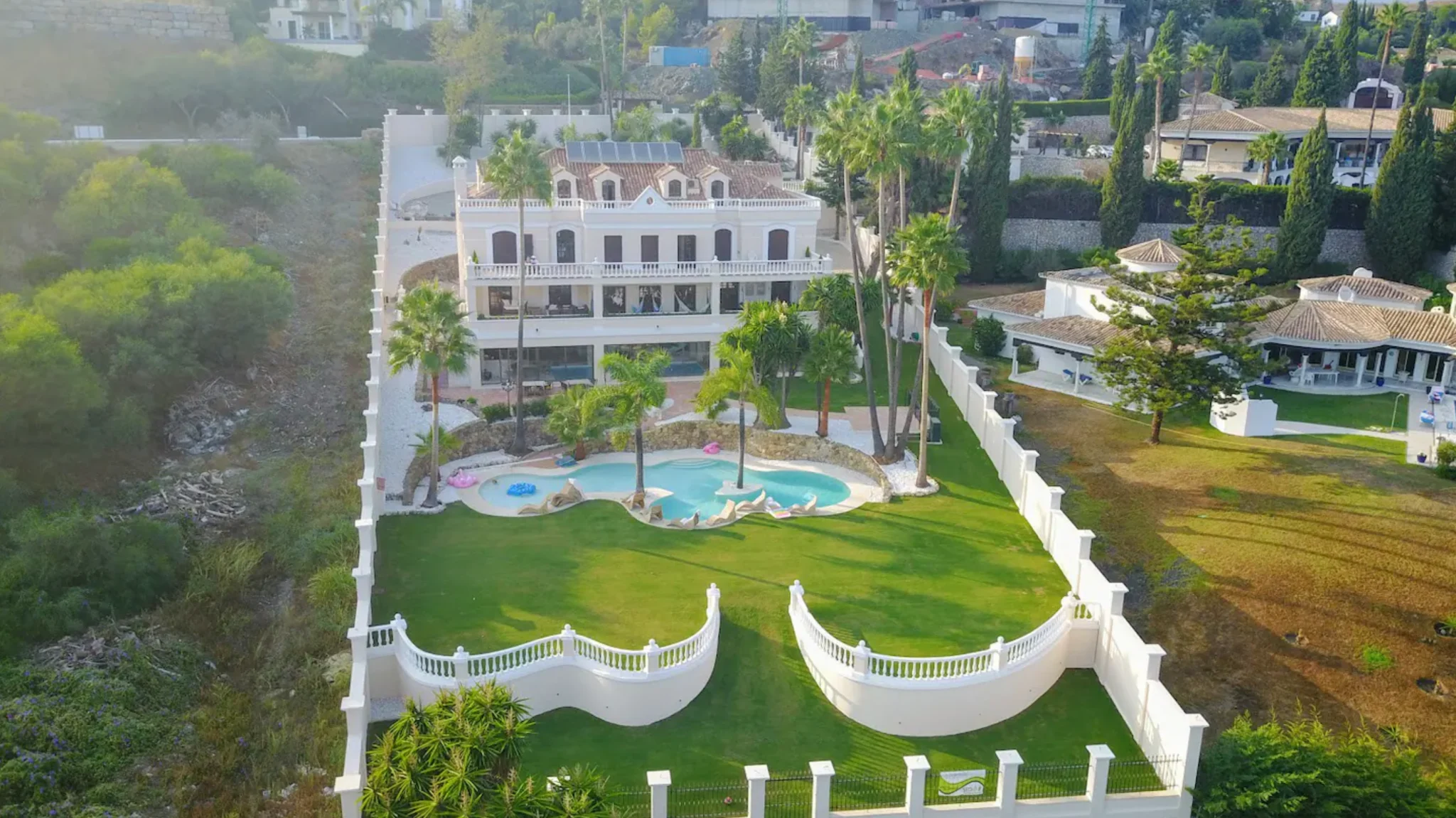 In contrary to popular belief, renting a luxury villa like this is not prohibitively costly when shared by all guests - It would be more expensive to stay in hotels.
In contrary to popular belief, renting a luxury villa like this is not prohibitively costly when shared by all guests - It would be more expensive to stay in hotels.Every year, we organize a non-profit event called Codecation. It’s a place to uncorp1 and work on something invigorating and fun. Peaking at 18 participants, finding a large enough venue poses a challenge. There needs to be ample space for computers and monitors while making sure that it doesn’t feel like a corporate event. Hotels and conference places would work, but they are often on the more expensive side and contingent upon guests following a schedule somewhat managed by external factors. Hence, Codecation takes place in luxury villas that are big and spacious enough to accommodate our needs, while providing a calm atmosphere for participants.
An added benefit of renting a private villa is that you’re given privacy. For participants to truly relax and have productive coding sessions, all potential attention-breaking issues must be resolved beforehand. This includes minor things that could stress your mind, such as an external person at the venue that you don’t know and need to be considerate about, having to go shopping or scheduled mandatory fun2. This year, we had the opportunity to stay in a nice Marbella villa by a golf course, managed by Morten, from Denmark.
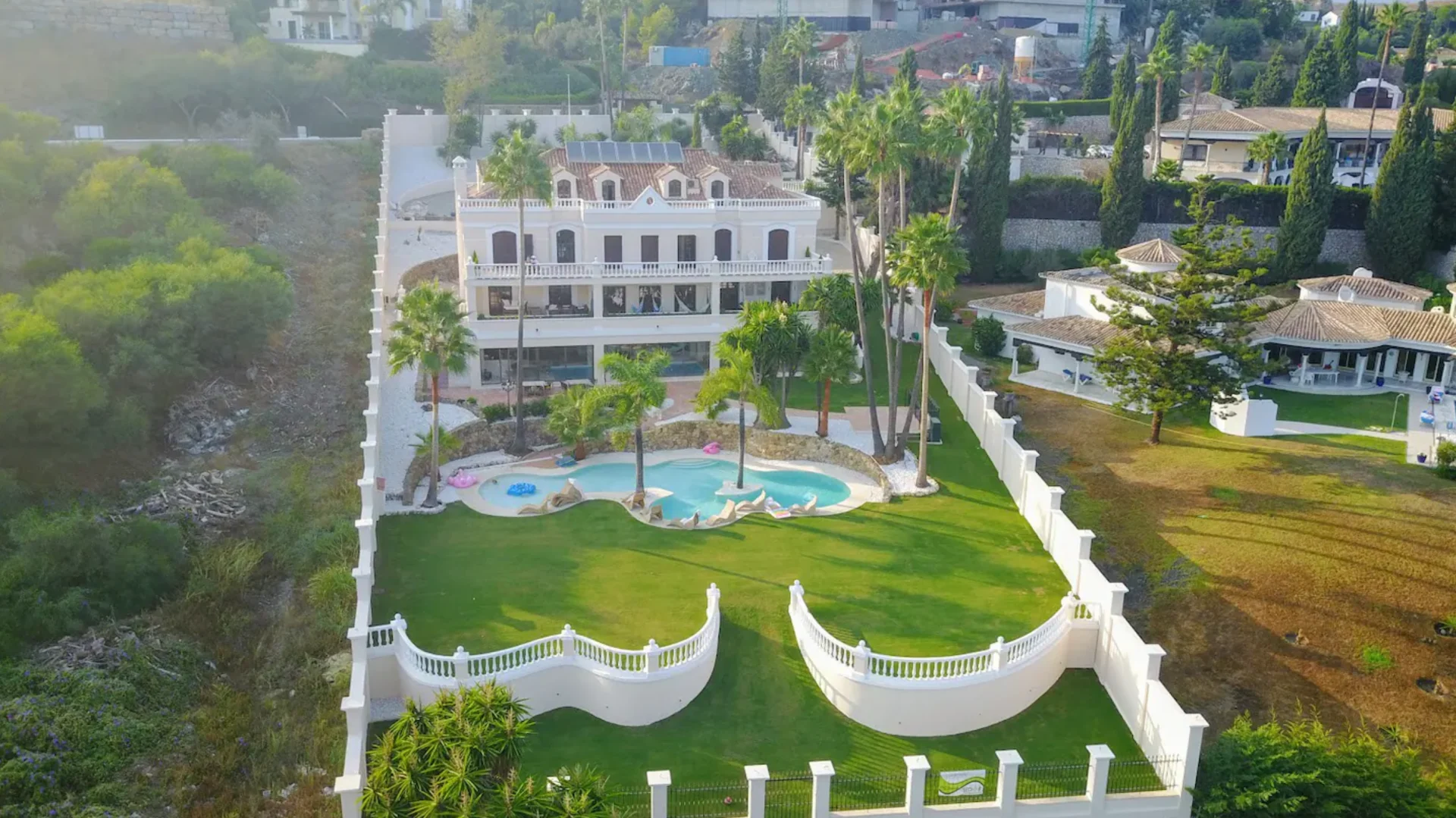 In contrary to popular belief, renting a luxury villa like this is not prohibitively costly when shared by all guests - It would be more expensive to stay in hotels.
In contrary to popular belief, renting a luxury villa like this is not prohibitively costly when shared by all guests - It would be more expensive to stay in hotels.The Villa featured 1000 mbps internet. There is no other thing that bothers software engineers more than a laggy internet connection for a week. Villas with great internet speed and proper access point installation / mesh network in the house are particularly hard to find. In addition, Morten provided plenty of monitors and office chairs so we didn’t have to bring our own. After a quick enumeration of the previous five locations we’ve stayed at over the years, everybody agreed that this was the best location so far.
One night between 4am and 7am, we had a little break-in. Marbella is known for its criminal activity, but with all the worriless sunbathing tourists, gated communities and barbed wire fences (the legit kind with actual razor blades in them) it is easy to give Costa del Sol the benefit of the doubt and feel safe.
When we woke up, our housekeeper wondered if we had a wild night because all of our bags were outside on the balcony with their contents scattered all over. The worst part about being burgled is the first sleepy seconds when you realize what has happened and your head starts spinning. Personal belongings were taken by someone who broke into your home. The stress and fear of what is missing and the anxiety of how this will be received by the participants. When something like this happens, I’m glad we bring humble, caring, pragmatic engineers for Codecation.
As an organizer, there’s a lot more administrative work to take care of and additional measures to implement to ensure that this doesn't happen again.
As a group of 16 software engineers with pricey laptops, the panic was palpable. If we for a second ignore the hassle of insurance claims, police reports and making sure participants feel safe on a personal level - losing your computer is frustrating, to say the least. Getting a new one can take time, and having devoted your time to a one week event abroad might force you to get a new one at a local market. Your preferred keyboard layout probably doesn’t exist and installing and restoring from a backup requires patience. Even if we give all engineers the benefit of the doubt to have taken proper disaster recovery precautions, your backups may not be cloud-based, they may very well be back at the office. API keys to your cloud accounts may need to be set up again, and impactful things like not being able to redeploy production while abroad could have severe consequences.
We had computers to steal for over €40 000, not counting monitors, keyboards, mouses and headphones. Fortunately, the burglars didn’t take a single computer, phone or other technical apparatus. Our wallets had been emptied for cash, but IDs and credit cards remained. Worries of identity theft and credit card fraud lingered.
Despite this, the haul was “only” a few nice jackets, a backpack and a total of €1500 in cash. Perhaps lucky, but it seems to be common practice and burglar code3 to only steal things that can be flipped easily. While computers are very valuable, they’re actually quite hard to sell. A completely risk-free factory reset procedure requires a little bit of competence, and the serial number may be reported to the police. With services around like Find my [Mac | iPhone | Watch], there’s simply too much risk of being exposed at some point. You also have to physically carry 15 laptops in a bag, which could be challenging considering the fact that you need to jump over a barbed wire fence on top of a 2 meter wall.
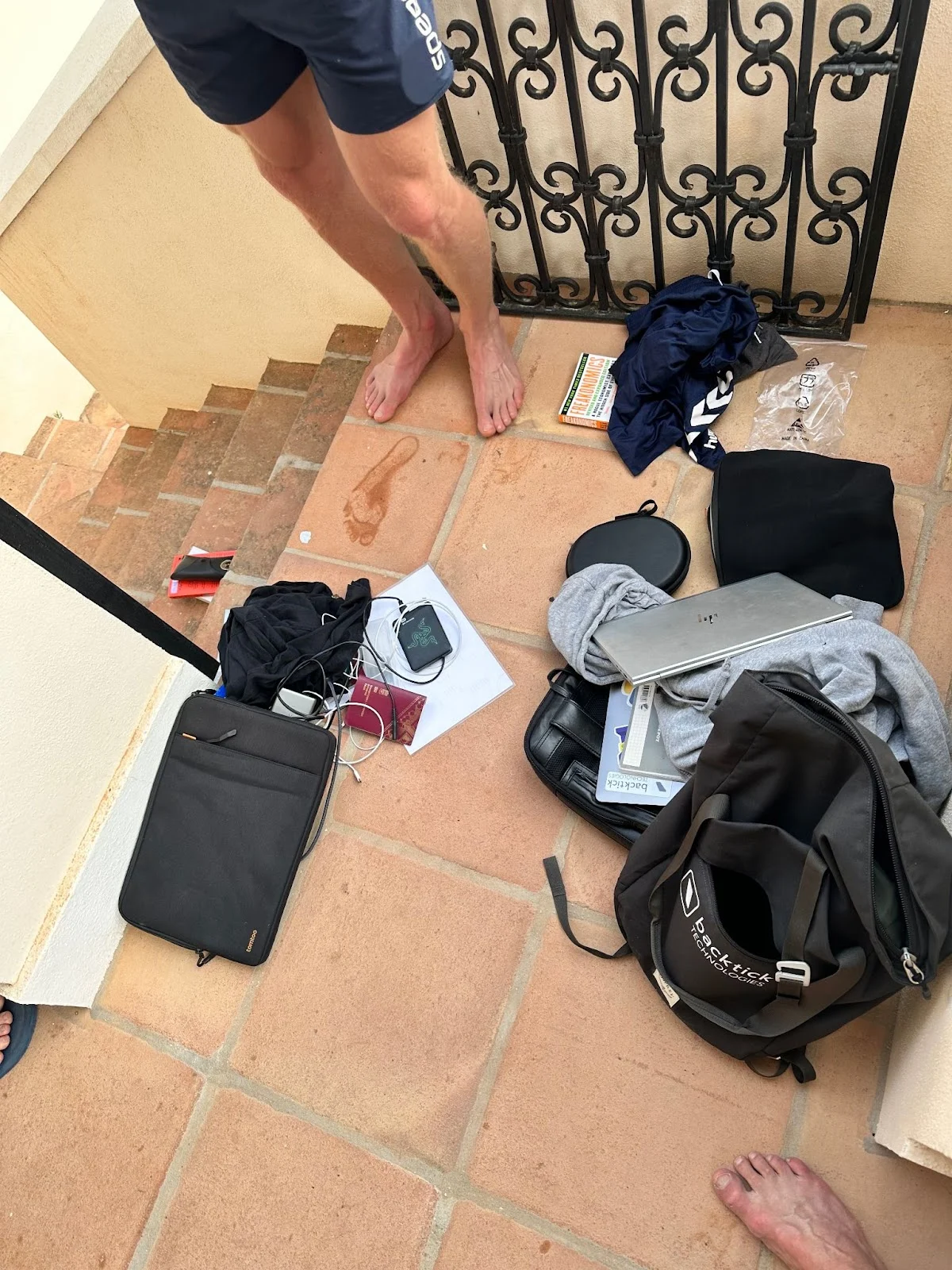 Backpacks poached for valuables, but all “real” valuables were left behind, fortunately.
Backpacks poached for valuables, but all “real” valuables were left behind, fortunately.
Phases of stealing
There are a few phases of stealing; breaking in, looting, getting out and converting your haul to cash.
Breaking in and looting is quite simple if you choose your target wisely. You can plan in advance and observe the property beforehand and gather information and make a risk-aware decision based on your initial analysis. You can assess the simplicity of breaking in, the risks involved and you may also be able to get a rough idea of the amount of valuables in the house by local factors such as multiple parked luxury cars or just by the appearance of the guests in the house. Although, I have no idea why 16 non-fancy engineers seemed like a good target, especially since no computers were stolen.
Getting out could be hard, especially if you overstayed your visit and people start waking up and neighbours start wondering what’s going on. It could also be hard to physically get out of the property based on the height of walls and other mechanics such as self-locking gates that were designed to trap you. Of course, this could be mitigated by planning ahead and creating a proper escape plan and bringing certain gear with you.
For the last phase, it helps if what you steal doesn’t link the actual theft to you. For example, if someone confronts you while you’re carrying around another person's passport or credit card, that’s sketchy. On the other hand, if you just have some cash, a jacket and a watch (that may or may not be your size or style), you can always claim that you’re just moving it for somebody, and there’s always room for other creative forms of plausible deniability4.
Moving on
After some accounting of lost items, it was a simple matter of cleaning up and going to report the incident at the police station. The officer sipping his machine coffee didn’t seem too enthusiastic to catch the perpetrator, and we took our leave with the police report for the insurance claim.
After some detective work of our own, we found traces of what looked like it belonged to a rug suspiciously lingering in the barbed wire fence. They had climbed the wall, jumped over and rushed to the terrace where they made their break-in. The thing about tall walls and barbed fences is that they may be easy to conquer while entering the property, but getting back out is hard. You simply have much less time and resources to prepare your departure, possibly leaving you stranded in the garden.
In this case, they had dragged a stack of sun beds to the wall, and used that as a stepping stone to jump back over again, possibly indicating that they knew the property beforehand, or had at least scouted it during the day at some point in the past.
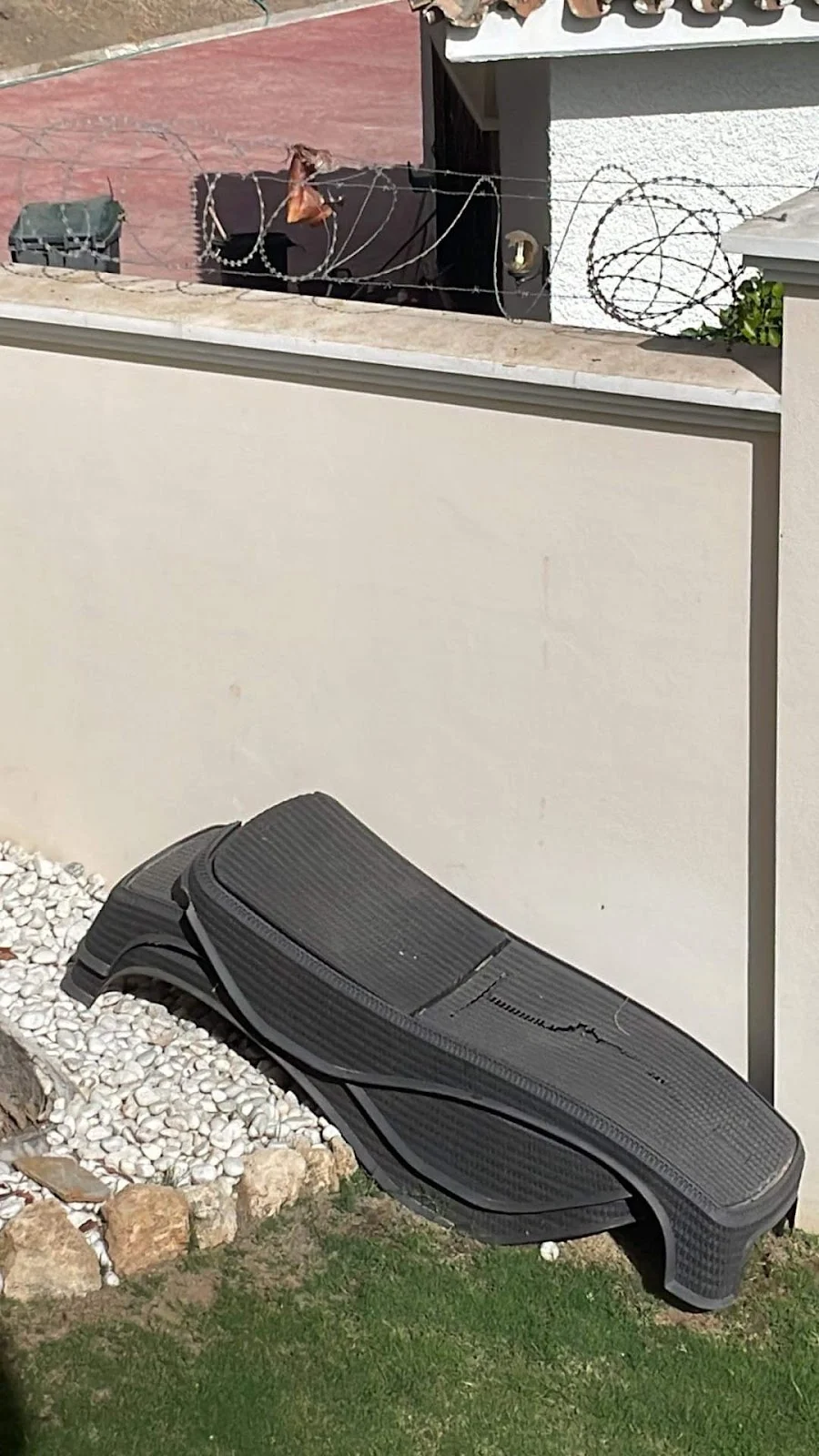 The escape route.
The escape route.
We assessed the probability of the burglars coming back as very low, but everybody was admittedly a bit more cautious with their stuff - hiding it in their bedrooms at night.
Surprisingly, very little debate was had and honestly nobody seemed to really care. Of course, if your stuff isn’t stolen, it’s easier to disconnect yourself from the event emotionally - but I expected participants to be a bit more psychologically disturbed by the fact that potentially dangerous perpetrators had been in the house. It makes sense that an event like this would make you feel unsafe. Likely, If it would’ve happened in your own apartment or house, it would have affected you more.
Furthermore, it isn’t just about you. How much you care about something like this extends to your peers. If they’d stolen just one person’s computer you would probably feel a lot more compassion and empathy for that person the rest of the week and the occurrence of this unfortunate event would be a bit more tangible.
We quickly decided this setback wasn’t worth any more of our energy - it was time to get back to coding. In hindsight, everybody was so relieved they didn’t lose their computer, ID or credit cards. The absolute worst-case scenario would have been far more disastrous.
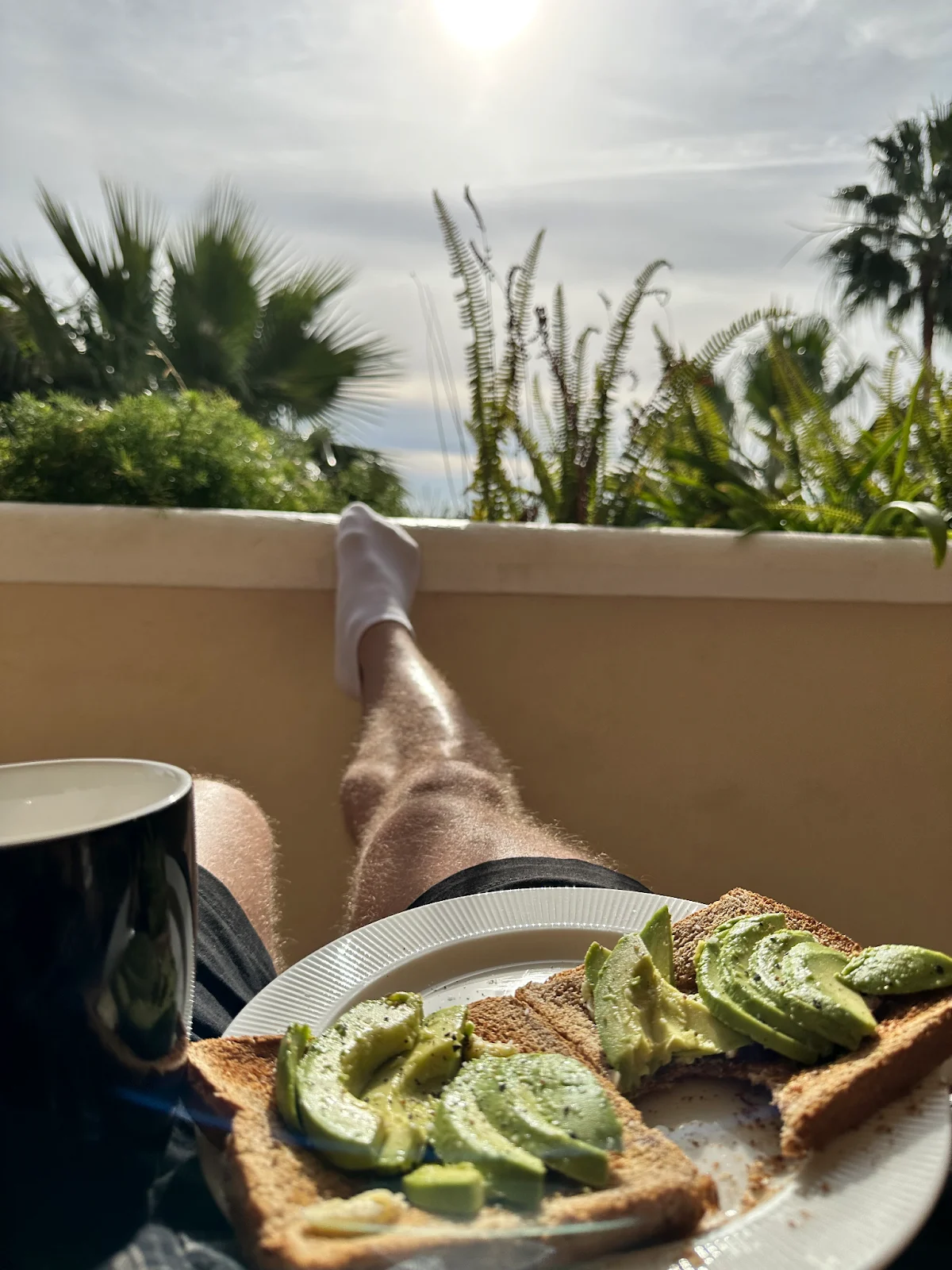 We were back to humble avocado toasts and sunny meetings on the terrace in no time!
We were back to humble avocado toasts and sunny meetings on the terrace in no time!
Notes
- 1. You know that feeling when you unwind from all work-stuff and just relax? It’s like that, but you still write code.
- 2. This is a term we use ironically all the time when we un-corp. It means you’re expected to have fun because the company organized something for you.
- 3. Not actual burglar code, but you know, an actual agreement beforehand to not steal computers, even if you end up finding a tempting computer zoo inside.
- 4. Like saying that the things are yours. Carrying three jackets in sunny Marbella isn’t very common, but there are certainly people who are particularly cold - especially at night.
Published on November 15th 2022
Last updated on March 22nd 2023, 07:26

Oskar Handmark
Founder & Venture lead